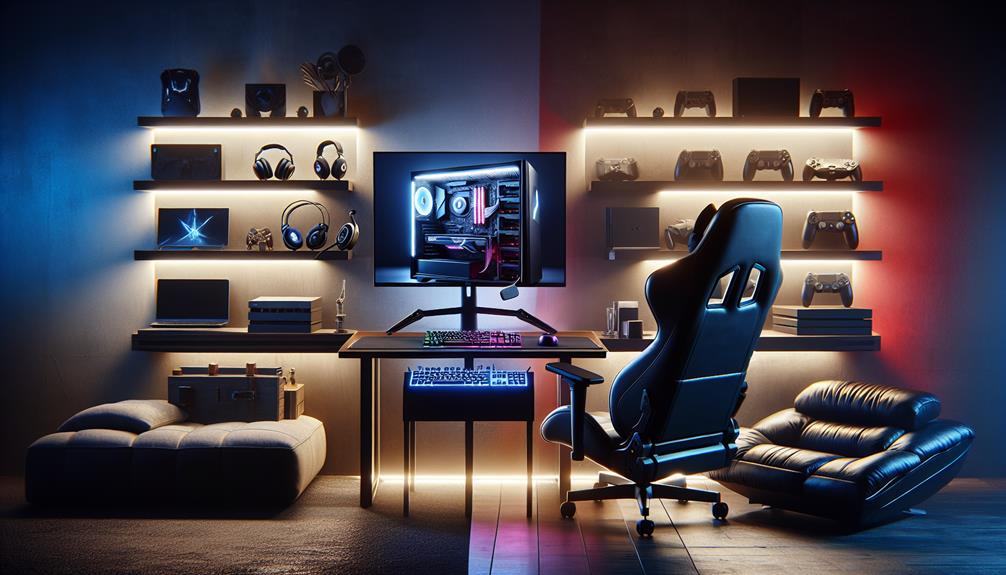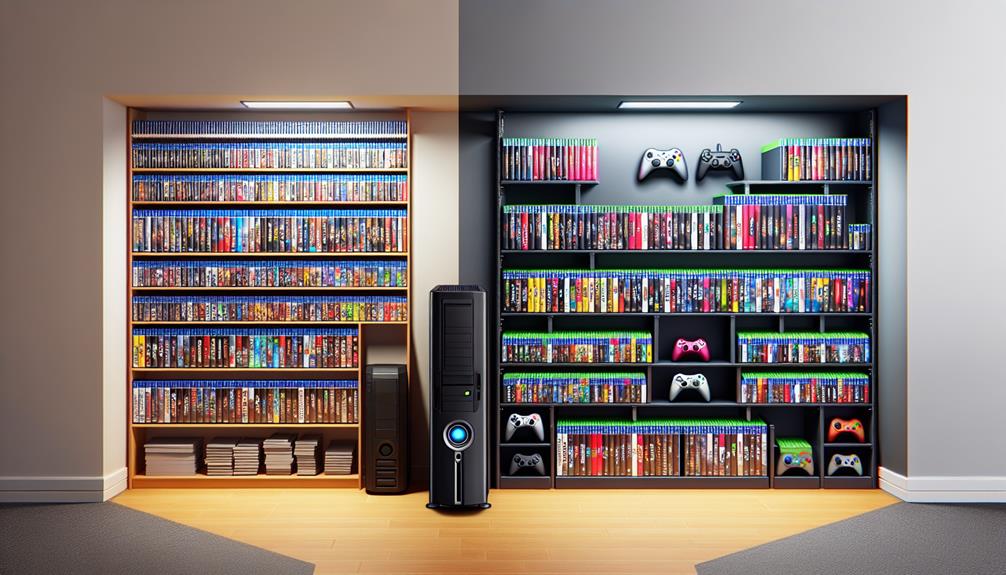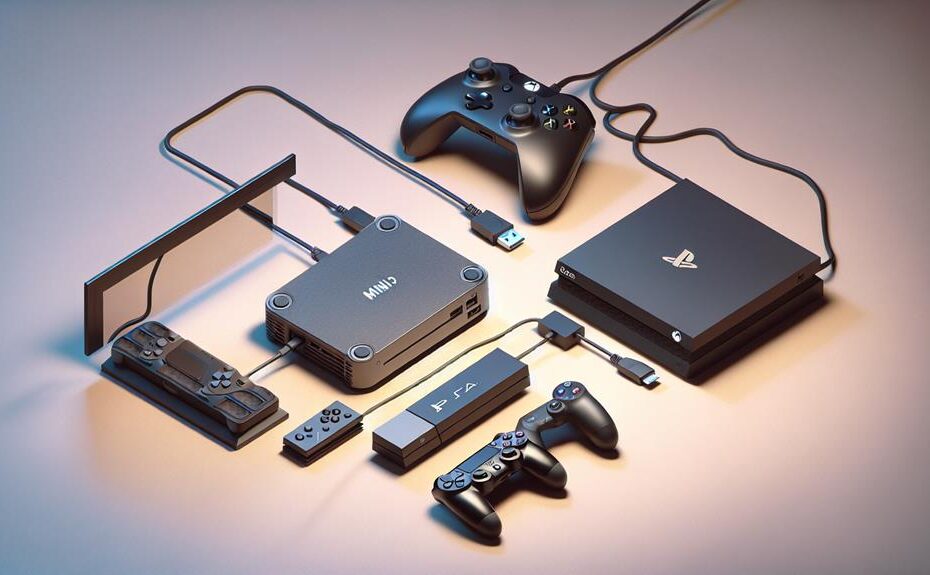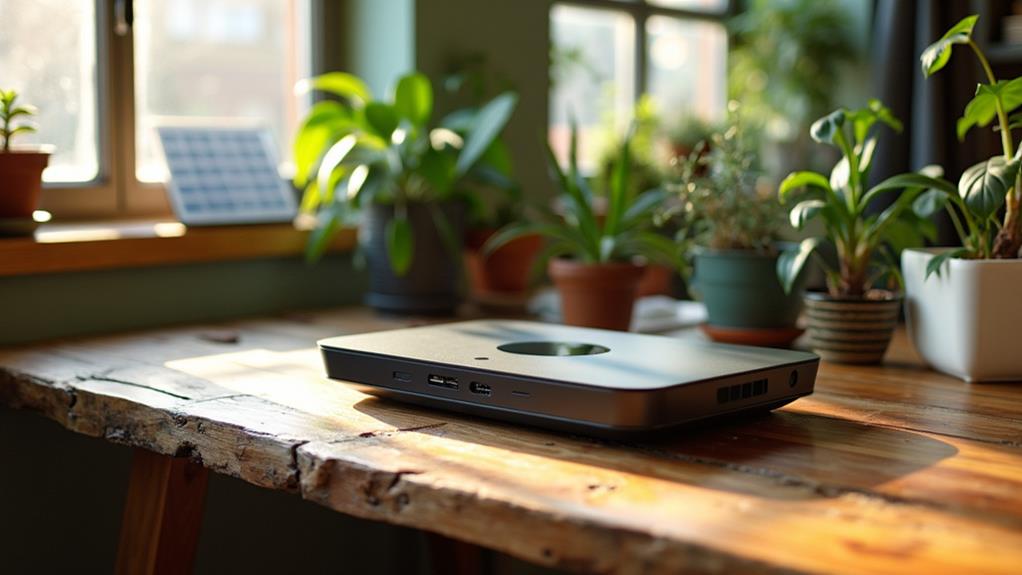



Mini PCs and consoles offer different strengths. Mini PCs deliver high performance and graphics with versatility for upgrades and customization. They cater to various gaming styles, reducing strain and clutter, but come at a higher upfront cost. Consoles boast optimized gameplay, affordable entry, and exclusives but may lack flexibility and quick obsolescence. Making the right choice depends on preferences for portability, setup ease, upgrade potential, and game library variations. Understanding these factors guides you to the ideal gaming experience tailored to your needs.
Key Takeaways
- Mini PCs offer higher gaming performance with powerful processors and dedicated graphics cards.
- Consoles are optimized for smoother gameplay experiences.
- Mini PCs excel in performance benchmarks with higher frame rates and resolutions.
- Mini PCs provide better visual fidelity with higher graphics settings and resolutions.
- Mini PCs offer versatility, customization, and easy upgrades for tailored gaming experiences.
Performance and Graphics Comparison
When comparing performance and graphics between mini PCs and console gaming systems, the key aspect to take into account is the hardware specifications and capabilities of each device. Mini PCs often boast powerful processors and dedicated graphics cards, allowing for high performance in gaming. Console gaming systems, on the other hand, are optimized for gaming specifically, which can result in smoother gameplay experiences.
Performance benchmarks are essential in determining how well a device can handle various games. Mini PCs tend to excel in this area due to their ability to be customized with high-end components. They can achieve higher frame rates and resolutions compared to consoles, providing a more immersive gaming experience. However, consoles are designed with specific games in mind, optimizing performance for those titles.
Visual fidelity is another aspect to consider when comparing mini PCs and consoles. Mini PCs typically offer better visual fidelity with the ability to support higher graphics settings and resolutions. This can result in sharper details and more realistic environments while gaming. Consoles, although they may not match the visual capabilities of mini PCs, often provide a consistent and optimized gaming experience across different titles.
Versatility and Customization Options
For a detailed comparison between mini PCs and console gaming systems regarding versatility and customization options, it is essential to analyze the range of features and flexibility each platform offers. Mini PCs grant portability benefits due to their compact size and lightweight design, allowing for easy transportation and setup in various locations. Additionally, mini PCs often boast aesthetic appeal with sleek designs that can complement any gaming setup.
When it comes to customization, mini PCs shine with their upgrade possibilities. Gamers can easily swap out components such as the graphics card, RAM, or storage to keep up with the latest technological advancements and tailor their system to meet specific gaming requirements. Furthermore, mini PCs are known for their space-saving features, making them ideal for those who have limited room for a gaming setup or prefer a clutter-free environment.
Input Devices and Controls

In evaluating input devices and controls for mini PCs versus console gaming systems, consider the functionality and ergonomic design provided by each platform. When it comes to comfort vs precision, mini PCs often offer a wider range of input devices, allowing for more customization to suit individual preferences. On the other hand, console gaming controllers are designed with precision in mind, offering a pivotal layout that many find familiar and easy to use.
Ergonomics play a pivotal role in determining the overall gaming experience. Mini PCs allow for flexibility in choosing peripherals that cater to specific ergonomic needs, potentially reducing strain during long gaming sessions. Console controllers are designed to fit comfortably in the hands of a wide range of users, promoting accessibility and ease of use.
Ultimately, the choice between mini PCs and console gaming systems regarding input devices and controls boils down to personal preference. Whether you prioritize comfort or precision, both platforms offer options that cater to different gaming styles and ergonomic requirements.
Cost Analysis and Value
Considering the financial aspect of gaming setups, evaluating the cost and value proposition between mini PCs and console gaming systems is essential. When comparing the price point, mini PCs tend to be pricier upfront due to their customization options and higher performance capabilities. On the other hand, console gaming systems are usually more affordable initially but may require additional expenses for accessories or online subscriptions.
In terms of long term investment, mini PCs offer greater flexibility for upgrades and modifications, allowing you to adapt to newer technologies without having to replace the entire system. This can result in cost savings in the long run as you can prolong the lifespan of your gaming setup. Console systems, while cheaper at the outset, may become outdated more quickly, necessitating the purchase of newer versions to keep up with evolving gaming demands.
Ultimately, the decision between a mini PC and a console gaming system comes down to your budget and preferences regarding long term investment. It's important to weigh the initial cost against the potential for future upgrades and adaptability to make an informed choice.
Game Library and Compatibility

When assessing game library and compatibility, one essential factor to take into consideration is the variety of titles available for each gaming platform. Game selection plays a vital role in determining the appeal and longevity of a gaming system. Mini PCs often offer a vast array of games, including popular titles and indie gems, thanks to their compatibility with various digital distribution platforms like Steam and Epic Games Store. On the other hand, console gaming provides exclusive titles that are optimized for specific hardware, offering a unique gaming experience not found elsewhere.
Platform compatibility is another key aspect to take into account when comparing mini PCs to consoles. Mini PCs are versatile regarding hardware requirements, allowing gamers to upgrade components for better performance or to meet the specifications of the latest games. In contrast, consoles have fixed hardware configurations, ensuring software compatibility but potentially limiting the ability to run newer or more demanding titles. Understanding how game selection and platform compatibility align with your gaming preferences can help you make an informed decision between mini PCs and consoles.
User Experience and Convenience
User immersion and seamless operation are pivotal aspects to consider when comparing mini PCs with console gaming for user experience and convenience. Mini PCs offer a portability advantage, allowing you to easily move your setup between rooms or even take it on the go. In relation to ease of setup, mini PCs often require minimal assembly compared to setting up a console and its accompanying peripherals.
When it comes to user interface and seamless integration, mini PCs can provide a more customizable experience. You have the flexibility to choose your preferred peripherals, adjust settings to your liking, and even upgrade components as needed. This level of customization can enhance your overall gaming experience and cater to your specific preferences.
However, consoles typically offer a more streamlined and standardized user interface, making them more straightforward for those who prefer a plug-and-play experience without much tinkering. The seamless integration of hardware and software in consoles ensures a consistent performance level without the need for manual optimizations. Ultimately, the choice between a mini PC and a console boils down to your preferences regarding portability, setup ease, customization, and user interface.
Disclosure: As an Amazon Associate, I earn from qualifying purchases.




